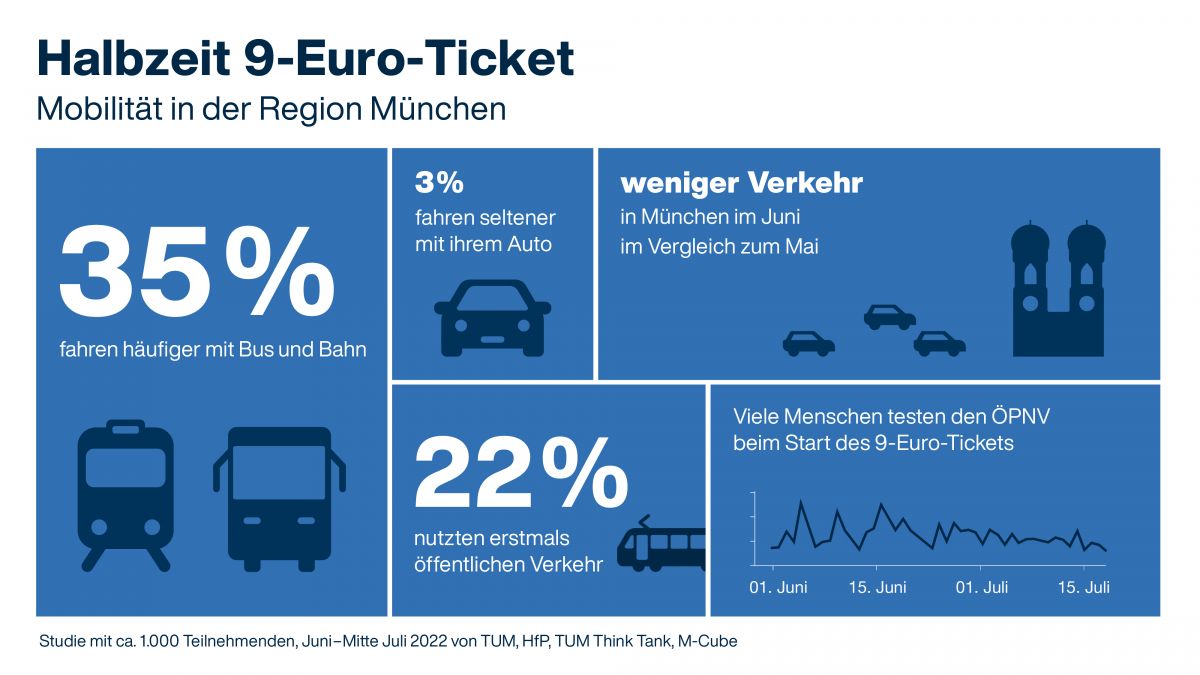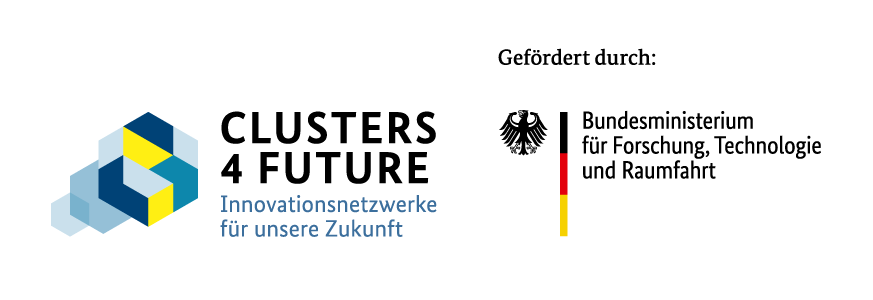Auch die vierte und letzte Speaker Series „Zukunft der Mobilität“, am 21. Juli 2022, im Sommersemester 2022 vor der Sommerpause war ein voller Erfolg. Diesmal haben unsere Gäste dem Publikum spannende Impulse zum derzeit viel diskutierten Thema „9EUR ticket | Mid-term review: New impetus for the mobility turnaround - what has changed and what's next?" given.
Unser erster Redner Dr. Markus Siewert (Leiter TUM Think Tank) gab uns einen kurzen Einblick in seine alltägliche Arbeit und wie der TUM Think Tank die derzeitigen politischen Themen beforscht. Er betonte, dass für die Wissenschaftlerinnen und Wissenschaftler eine einmalige und riesige Chance ist ein Reallaborexperiment wie das 9EUR-Ticket zu beforschen.
Bevor Fabienne Cantner und Allister Loder (Wissenschaftlerin und Wissenschaftler der TUM) die Zwischenergebnisse der Studie präsentierten, erklärten sie, dass für die Befragung der Studienteilnehmenden eine Kombination aus einer Tracking-App (nur für Metropolregion München) und drei deutschlandweiten Befragungen gewählt wurde. Nur so sei es möglich relevante und aussagekräftige Daten der Studie zu erhalten.
The support of the study participants for the EUR 9 ticket is very high. However, this shows that car owners and people in rural areas are less willing to buy the EUR 9 ticket. It is surprising, however, that there are no income effects on the willingness to buy the ticket.

Der letzte Impuls kam von Jana Kugoth (Redaktionsleitung Tagesspiegel) die einen Einblick ins Thema gab, indem sie die gemischten Stimmen unterschiedlicher Branchen zum 9EUR-Ticket aufzählte. Denn es gab nicht nur Unterstützter des 9EUR-Tickets. Jana Kugoth zeigt auf, dass das 9EUR-Ticket als Realexperiment gute Einblicke ins Mobilitätsverhalten der Bevölkerung gibt und die Branchen nach Druck von außen nun weiter handeln müssen. Die Einführung des 9EUR-Ticket hat eine Debatte für die Neustrukturierung des ÖPNVs zum Laufen gebracht und bietet einem Thema, welches Jahre von der Politik vernachlässigt wurde, nun ein Diskussionspotential für die Zukunft.
Abschließend haben Nico Nachtigall und Lennart Adenaw (Wissenschaftler TUM) dem Publikum die Daten der Studie auf einem Dashboard visualisiert gezeigt und somit noch einmal alle Ergebnisse erklärt.
In summary, it can be said that the study on the EUR 9 ticket has already provided exciting data halfway through the test period, but it is utopian to expect a change in the population's behavior within six weeks.
We are very much looking forward to the final results of the study and whether they will influence the debate about a potential successor ticket.
Further information on the study can be found on the Website of the School of Politics to find.
We would like to thank the organizers and those responsible at the Deutsches Museum as well as our speakers.
A new study by MCube Consulting on behalf of Zukunft Nahverkehr (ZNV) shows: Local public transport generates three times as much revenue for the German economy as it costs.
Mobility is at the heart of Germany's economic and innovative strength, the key to climate neutrality and the core of everyday life.
MCube had its own stand at the trade fair and brought together over 100 mobility pioneers at the "Bridging City Innovation Ecosystems" event above the rooftops of Barcelona.
What does the bus of tomorrow need to look like to convince as many people as possible to change buses voluntarily?
Our experts gave keynote speeches on why we need fair, inclusive mobility that is suitable for everyday use for everyone.
The city council of Landsberg am Lech has unanimously approved the new traffic development plan (VEP).
Innovation pioneers meet in Jülich to share transfer strategies, forge alliances and shape the future.
Why we should learn to celebrate construction sites - and finally shape mobility based on facts and together.
With over 130 new employees, Germany's future cluster MCube at Munich Urban Colab entered the next project phase on April 9, 2025 - and at full speed.
What if fewer cars were normal in the city?
No results available
